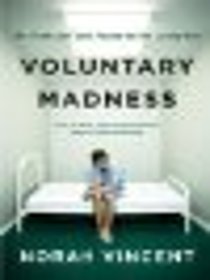Helpful Score: 2
I have to admit that I didn't finish it, and that is rare for me. Although it got better as it reached the middle of the book, I was annoyed by the author's attitude toward medication, other patients, and several other details I won't go into. And aside from that I found it to be rather boring.
Sophia C. reviewed Voluntary Madness: My Year Lost and Found in the Loony Bin on + 289 more book reviews
Helpful Score: 2
When self-styled immersion journalist Norah Vincent found herself veering towards a depressive breakdown towards the end of her undercover-as-a-man research for her first book, Self-Made Man, she emerged with the idea for another project. Dealing with depression for many years and having been hospitalized for it, she checked herself into three mental health institutions over a course of a year with the intent to write about it. Voluntary Madness is the result of her efforts. The three facilities ranged from Meriwether, an overburdened urban hospital with mostly an indigent and minority population; St Lukes, a private Catholic clinic in the rural Midwest; to Mobius, an alternative private clinic in California.
Alternatively, they could have been named Worst, Better, and Best. Not surprisingly, the book became easier to read as she progressed through them. Vincent's scathing diatribe in Meriwether can only be matched by her inability to see her bias -- as a more educated, astute, or "with it" patient, she writes as if she has uncovered all is wrong with psychiatry and the "system." However, she merely sees it from the patient side, without being totally able to relate to her wardmates, or understand how troubling mental illness can be in someone else's experience. Going through a real depressive episode during St Lukes, Vincent points out how it is materially better but bland in its effect. Finally, she finds real help in Mobius, where patients more like herself live in unlocked apartments and participate in a therapy-intense, medication-light program with Buddhist overtones. Here the reader learns more about Vincent's past, something one would think would have been disclosed earlier on such an intimate journey.
Vincent's conclusion--one willing to cultivate one's mental health can do so--is uplifting, but, like Mobius, probably would only benefit an already receptive audience. Not believing that one has to agree with what the author has to say for a book to be worth reading, I found this an interesting read, keeping in mind Vincent's biases and a tendency towards professional experimental autobiography instead of the more objective-sounding immersion journalism.
Alternatively, they could have been named Worst, Better, and Best. Not surprisingly, the book became easier to read as she progressed through them. Vincent's scathing diatribe in Meriwether can only be matched by her inability to see her bias -- as a more educated, astute, or "with it" patient, she writes as if she has uncovered all is wrong with psychiatry and the "system." However, she merely sees it from the patient side, without being totally able to relate to her wardmates, or understand how troubling mental illness can be in someone else's experience. Going through a real depressive episode during St Lukes, Vincent points out how it is materially better but bland in its effect. Finally, she finds real help in Mobius, where patients more like herself live in unlocked apartments and participate in a therapy-intense, medication-light program with Buddhist overtones. Here the reader learns more about Vincent's past, something one would think would have been disclosed earlier on such an intimate journey.
Vincent's conclusion--one willing to cultivate one's mental health can do so--is uplifting, but, like Mobius, probably would only benefit an already receptive audience. Not believing that one has to agree with what the author has to say for a book to be worth reading, I found this an interesting read, keeping in mind Vincent's biases and a tendency towards professional experimental autobiography instead of the more objective-sounding immersion journalism.




